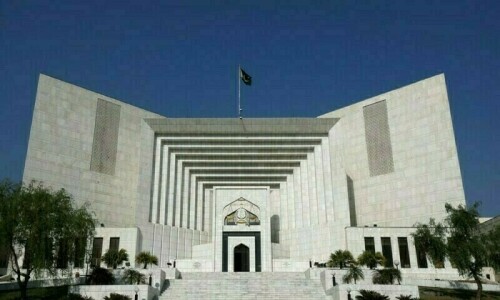ISLAMABAD: Two premier representative bodies of lawyers have hinted at mounting a challenge to the ordinance through which the president has been empowered to extend the term of retired Justice Javed Iqbal, the National Accountability Bureau’s (NAB) chairman. His four-year term is set to end on Friday (today).
The two bodies are the Pakistan Bar Council (PBC) and the Supreme Court Bar Association (SCBA).
“I have called an urgent meeting of the PBC’s executive committee at the Supreme Court building on Friday in which the chairmen of other councils and associations have also been invited to ponder over the promulgation of the NAB ordinance,” said PBC vice chairman Khushdil Khan while talking to Dawn.
The present government has set a wrong example of governing through ordinances, he regretted, adding that the presidency — the highest office of the state — has been turned into a “mere ordinance factory”.
Lawyers’ bodies to consider option of challenging govt decision before Supreme Court
“During the meeting we may consider the option of challenging the National Accountability (Second Amendment) Ordinance before the Supreme Court,” the PBC vice chairman said.
Muhammad Faheem Wali, chairman of the executive committee, and Abdul Latif Afridi, who heads the Supreme Court Bar Association, said in a statement that the PBC would chalk out its future course of action against the “draconian law” after consultations with other bar bodies.
The statement described the issuance of the ordinance as an attempt to undermine parliament.
The provision to allow the incumbent NAB chairman to continue in his office is devoid of any merit and a person-specific amendment in derogation of the settled law, Faheem Wali and Latif Afridi added.
“The appointment of officers as judges of accountability courts on lucrative packages appears to be an attempt to encroach upon the independence of the judiciary,” said the statement.
Criteria for judge of accountability court
Section 5A of the National Accountability Ordinance (NAO) empowers the president to appoint any person as judge of an accountability court who is a serving district and sessions judge or an additional district and sessions judge.
It further empowers the president to appoint any individual as judge of an accountability court who is a judge of a high court or a retired district judge or a retired additional district and sessions judge or a serving or retired judge of a special court.
The ordinance has laid down that a judge of an accountability court will be appointed for three years on such pay and allowances as that of the judge of a high court and that the judge of an accountability court could only be removed by the president before the expiry of his tenure only if he is guilty of misconduct or is incapable of properly performing the duties of his office due to physical or mental incapacity.
The ordinance also stated that disciplinary proceedings against an accountability court judge could be conducted in the same manner and under the same legal provisions and rules as prescribed for a district and sessions judge.
Likewise, section 6 of NAO was substituted through which the incumbent NAB chairman, on the expiry of a period of four years, could be appointed for a fresh term of four years by the president.
In addition, substitution was also made in section 9 of the ordinance under which all offences under NAO will be non-bailable and that no court other than the accountability court concerned will have the power to grant bail to an accused person.
If the accused person is released on bail, the ordinance says, the amount of surety must be commensurate with the gravity of the charge against such a person.
Published in Dawn, October 8th, 2021













































Dear visitor, the comments section is undergoing an overhaul and will return soon.